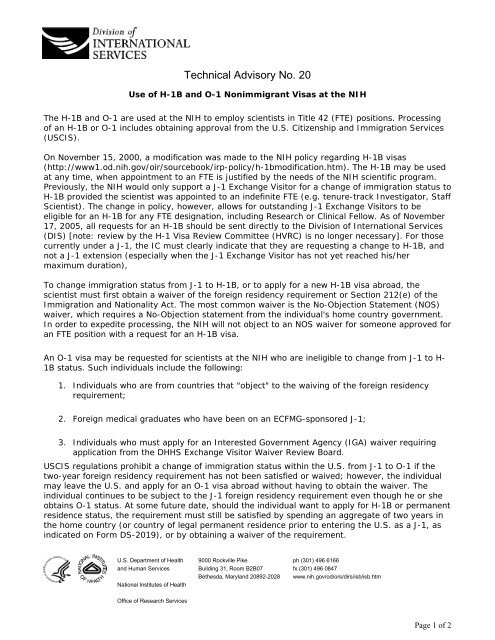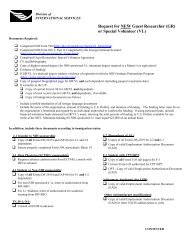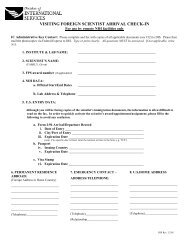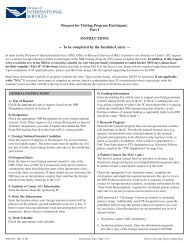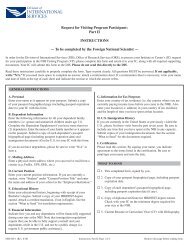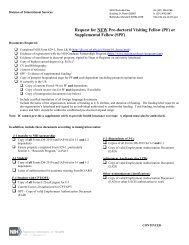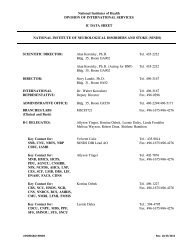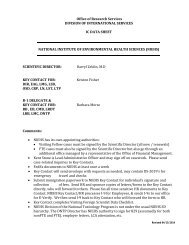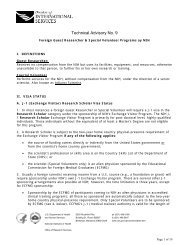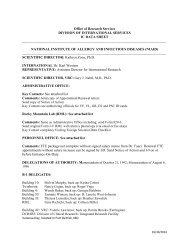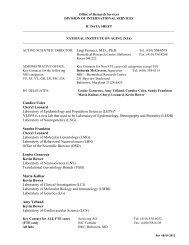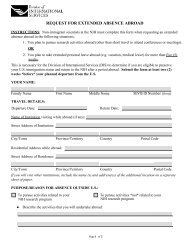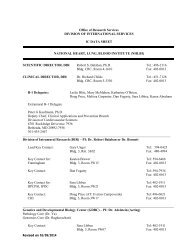Overview - NIH Division of International Services - National Institutes ...
Overview - NIH Division of International Services - National Institutes ...
Overview - NIH Division of International Services - National Institutes ...
Create successful ePaper yourself
Turn your PDF publications into a flip-book with our unique Google optimized e-Paper software.
Technical Advisory No. 20<br />
Use <strong>of</strong> H-1B and O-1 Nonimmigrant Visas at the <strong>NIH</strong><br />
The H-1B and O-1 are used at the <strong>NIH</strong> to employ scientists in Title 42 (FTE) positions. Processing<br />
<strong>of</strong> an H-1B or O-1 includes obtaining approval from the U.S. Citizenship and Immigration <strong>Services</strong><br />
(USCIS).<br />
On November 15, 2000, a modification was made to the <strong>NIH</strong> policy regarding H-1B visas<br />
(http://www1.od.nih.gov/oir/sourcebook/irp-policy/h-1bmodification.htm). The H-1B may be used<br />
at any time, when appointment to an FTE is justified by the needs <strong>of</strong> the <strong>NIH</strong> scientific program.<br />
Previously, the <strong>NIH</strong> would only support a J-1 Exchange Visitor for a change <strong>of</strong> immigration status to<br />
H-1B provided the scientist was appointed to an indefinite FTE (e.g. tenure-track Investigator, Staff<br />
Scientist). The change in policy, however, allows for outstanding J-1 Exchange Visitors to be<br />
eligible for an H-1B for any FTE designation, including Research or Clinical Fellow. As <strong>of</strong> November<br />
17, 2005, all requests for an H-1B should be sent directly to the <strong>Division</strong> <strong>of</strong> <strong>International</strong> <strong>Services</strong><br />
(DIS) [note: review by the H-1 Visa Review Committee (HVRC) is no longer necessary]. For those<br />
currently under a J-1, the IC must clearly indicate that they are requesting a change to H-1B, and<br />
not a J-1 extension (especially when the J-1 Exchange Visitor has not yet reached his/her<br />
maximum duration),<br />
To change immigration status from J-1 to H-1B, or to apply for a new H-1B visa abroad, the<br />
scientist must first obtain a waiver <strong>of</strong> the foreign residency requirement or Section 212(e) <strong>of</strong> the<br />
Immigration and <strong>National</strong>ity Act. The most common waiver is the No-Objection Statement (NOS)<br />
waiver, which requires a No-Objection statement from the individual's home country government.<br />
In order to expedite processing, the <strong>NIH</strong> will not object to an NOS waiver for someone approved for<br />
an FTE position with a request for an H-1B visa.<br />
An O-1 visa may be requested for scientists at the <strong>NIH</strong> who are ineligible to change from J-1 to H-<br />
1B status. Such individuals include the following:<br />
1. Individuals who are from countries that "object" to the waiving <strong>of</strong> the foreign residency<br />
requirement;<br />
2. Foreign medical graduates who have been on an ECFMG-sponsored J-1;<br />
3. Individuals who must apply for an Interested Government Agency (IGA) waiver requiring<br />
application from the DHHS Exchange Visitor Waiver Review Board.<br />
USCIS regulations prohibit a change <strong>of</strong> immigration status within the U.S. from J-1 to O-1 if the<br />
two-year foreign residency requirement has not been satisfied or waived; however, the individual<br />
may leave the U.S. and apply for an O-1 visa abroad without having to obtain the waiver. The<br />
individual continues to be subject to the J-1 foreign residency requirement even though he or she<br />
obtains O-1 status. At some future date, should the individual want to apply for H-1B or permanent<br />
residence status, the requirement must still be satisfied by spending an aggregate <strong>of</strong> two years in<br />
the home country (or country <strong>of</strong> legal permanent residence prior to entering the U.S. as a J-1, as<br />
indicated on Form DS-2019), or by obtaining a waiver <strong>of</strong> the requirement.<br />
U.S. Department <strong>of</strong> Health 9000 Rockville Pike ph (301) 496 6166<br />
and Human <strong>Services</strong> Building 31, Room B2B07 fx (301) 496 0847<br />
Bethesda, Maryland 20892-2028 www.nih.gov/od/ors/dirs/isb/isb.htm<br />
<strong>National</strong> <strong>Institutes</strong> <strong>of</strong> Health<br />
Office <strong>of</strong> Research <strong>Services</strong><br />
Page 1 <strong>of</strong> 2
The standard for an O-1 <strong>of</strong> "extraordinary ability in the sciences" is that the individual is one <strong>of</strong> a<br />
small percentage <strong>of</strong> individuals who have risen to the very top <strong>of</strong> their field <strong>of</strong> endeavor, and who<br />
are coming to the U.S. to continue work in the area <strong>of</strong> extraordinary ability by engaging in a<br />
specific event, i.e., a research project. Evidence must be supplied to establish that the standard<br />
has been met.<br />
Consult with DIS first to determine if the O-1 is the only option. Once confirmed, please submit a<br />
memorandum requesting O-1 classification and a copy <strong>of</strong> the candidate's curriculum vitae to DIS.<br />
The memorandum should address the candidate's research accomplishments and note how he/she<br />
will meet the O-1 criteria. The request must be sent directly to DIS. DIS will review the request to<br />
determine if an O-1 is approvable. If it is determined that an O-1 could be approved, the IC will be<br />
contacted by DIS to schedule a meeting <strong>of</strong> all interested parties to develop plans for the petitioning<br />
process. An O-1 petition may not be filed more than 6 months prior to the expected effective date;<br />
the USCIS requires approximately two to three months to process the petition, but this is always<br />
subject to change. Alternatively, for an extra fee, premium processing <strong>of</strong> the O-1 petition is<br />
available by USCIS; under premium processing, USCIS will make a decision on the petition<br />
(approval, denial, or request for additional evidence) in 15 days. Please consult with DIS to discuss<br />
the use <strong>of</strong> premium processing.<br />
The information in the first link below reflects the similarities and differences between the two<br />
nonimmigrant classifications. It should be helpful in planning your course <strong>of</strong> action. If you have any<br />
questions, please contact your DIS Team at 496-6166 (fax: 496-0847)<br />
DIS Rev. 11/05<br />
U.S. Department <strong>of</strong> Health 9000 Rockville Pike ph (301) 496 6166<br />
and Human <strong>Services</strong> Building 31, Room B2B07 fx (301) 496 0847<br />
Bethesda, Maryland 20892-2028 www.nih.gov/od/ors/dirs/isb/isb.htm<br />
<strong>National</strong> <strong>Institutes</strong> <strong>of</strong> Health<br />
Office <strong>of</strong> Research <strong>Services</strong><br />
Page 2 <strong>of</strong> 2


